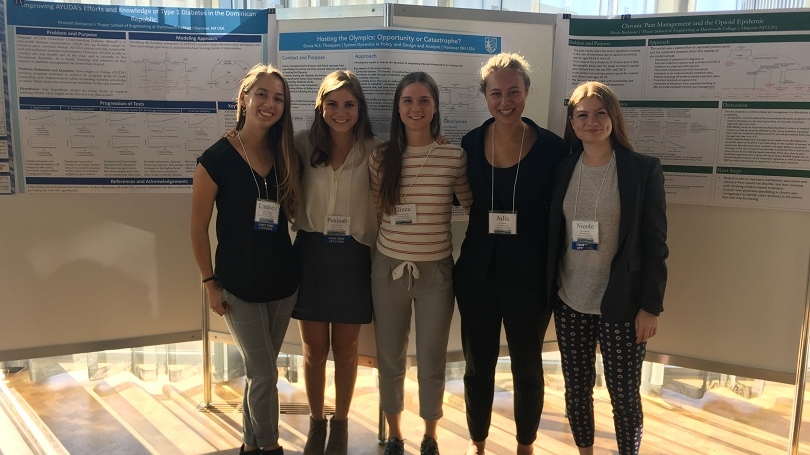
- Public Policy
- Leadership
- Funding
- News & Events
- About the Center
Back to Top Nav
Back to Top Nav
Back to Top Nav
Back to Top Nav
Mini-Grant recipient, Julia Huebner ’20, shares her experience attending the International Systems Dynamics Conference in Reykjavik, Iceland during the summer term.
This August, I attended the International Systems Dynamics Conference in Reykjavik, Iceland, as one of a group of six female Dartmouth College presenters. The ISDC provides a formal space to discuss the current landscape of the system dynamics field and opportunities for experts to apply the System Dynamics method to the greatest social challenges facing our society. The method of System Dynamics thinking includes the consideration of a condition’s quantitative change over time, positive and negative feedback loops, and accumulated stocks.
In Winter 2018, as part of Professor Steve Peterson’s Engineering 18 (Policy Systems) class, I build a model in STELLA that explores the plausibility of an electricity death spiral. With Professor Peterson’s help, I was able to transform my model and resulting insights into a sleek poster, which I submitted to the ISDC selection committee for possible presentation at this year’s conference. My poster was chosen, and I had the opportunity to travel to Iceland for 3 days of the 4-day conference.
Still a beginner after just one term of system dynamics thinking, I was able to learn so much about the applications of systems dynamics on an international scale. I attended a handful of plenary sessions, in which an expert would present on his/her finalized or work in process model. I learned about the world of possible applications of system dynamics thinking, including in education, policy, economics, energy, business, international relations, and psychology, to name a few. The most interesting problems that I saw tackled at the ISDC were those of binge drinking on college campuses and the reality of sexual assault of young adult women. These problems—often thought of as unsolvable—were able to be attacked from a new angle with the help of systems thinking. Projects of such magnitude and seriousness empowered me to brainstorm all the ways that I might better apply system dynamics to the realities (both good and bad!) of the Dartmouth experience.
While learning about the vast world of system dynamics was inspiring, being able to hone my presentation skills was also a main take-away of the conference. I had never had the opportunity to truly present my research before people who arguable knew more than I did. That realization gave me the humility to admit where my model had shortcomings but the confidence to present what I did know with pride. The feedback that industry experts gave me can be applied back into the model to make it better in the future. Ultimately, the opportunity to brush shoulders with experts in this industry, learn about their transformative models, and build confidence with presenting my own model made ISDC 2018 an extremely valuable experience.
I’ve learned a number of new skills from the International Systems Dynamics Conference and plan to apply them both in curricular and interpersonal contexts. Attending the conference made me more at ease with creating “back of the envelop” systems sketches, which I hope to apply to a system thinking workshop with the next class of ENGS18 as a teaching assistant, if schedules permit. I also plan to bring this method to problem-solving situations as they come up, especially on-campus in regard to thinking about the feedback sexual assault-prevention efforts and attrition rates for campus organizations. The poster that I’ve created about the electricity death spiral is available online, and I will have the opportunity to share it both with future students interested in energy policy and with the next cohort of ENGS18 students after a more formal introduction in the winter.
-Submitted by Julia Huebner '20 , Rockefeller Center Mini Grant Recipient
The Rockefeller Center's Mini-Grants program funds registration fees for students attending conferences, as well as the costs of bringing guest speakers to Dartmouth. The views and opinions expressed here are the author’s own and do not necessarily represent the views and opinions of the Rockefeller Center or constitute an endorsement by the Center.